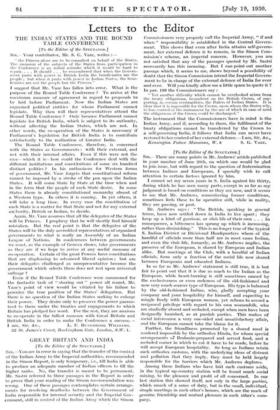GREAT BRITAIN AND INDIA
Commissioners very properly call the Imperial Army, " if and when " responsibility is established in the Central Govern- ment. This shows that even after India attains self-govern- ment, her external defence is to remain, in the Simon Com- mission's scheme, an imperial concern. However, you are not satisfied that any of the passages quoted by Mr. Sastri necessarily has this meaning. But I can point out another passage which, it seems to me, shows beyond a possibility of doubt that the Simon Commission intend the Imperial Govern- ment to be in charge of the external defence of India for ever and ever. Will you kindly allow me a little space to quote it ? In par. 199 the Commissioners say
" Yet another difficulty which cannot be overlooked arises from the treaty obligations, incumbent on the British Crown, of sup- porting, in certain eventualities, the Rulers of Indian States. It is clear that it is impossible for the Crown, upon whom the States rely, to lose control of the instrument by the use of which in ease of need the obligations of the Crown could be discharged."
The instrument that the Commissioners have in mind is the Indian Army, and if, according to them, the fulfilment of the treaty obligations cannot be transferred by the Crown to a self-governing India; it follows that India can never have restored to her control of her external defence.—I am, Sir, &e., Kensington Palace Mansions, W. 8 S. G. VAZE.
















































 Previous page
Previous page